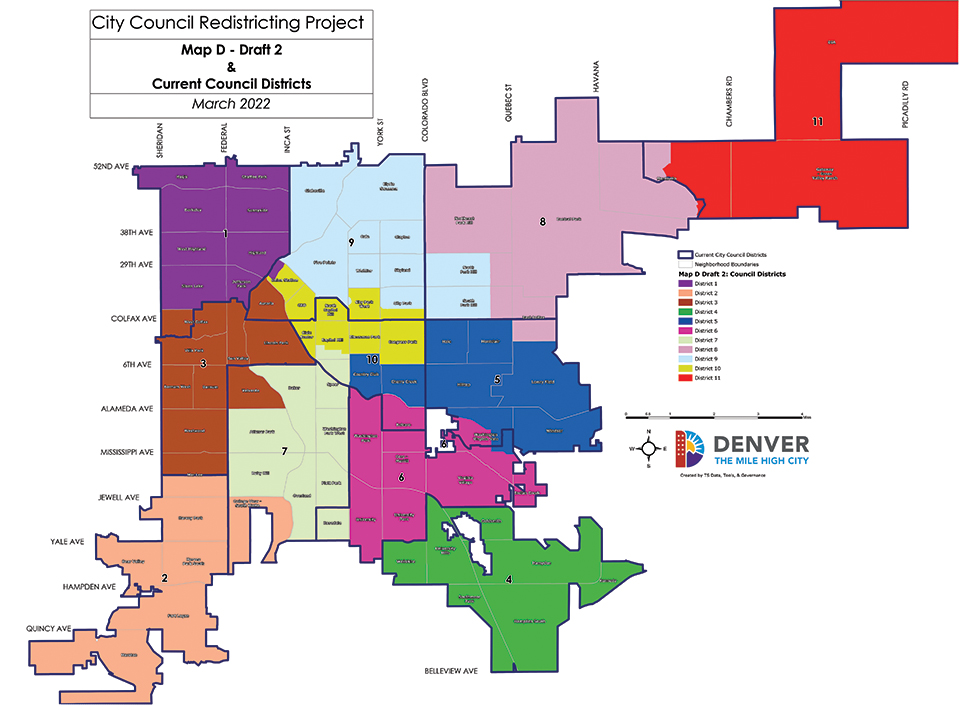
On March 29, the Denver City Council decided on new council district boundaries after a year-long process and multiple versions of maps. The council agreed on a revised Map D, which will stay in place for a minimum of 10 years until the next census data is determined. The 12-1 vote to send map D into action will have a major impact on local government and elections through the next decade.
Map D’s new district boundaries will come into play starting in 2023, with the municipal elections taking place in the spring. The council worked on the redistricting process for the past year and aimed to get Denver communities more involved and aware of the process. The council let people send in their own maps through the Denver Redistricting website, though no community submitted maps were part of the official review process.
The changes made to the 11 districts following the passage of Map D include moving a large section of Councilwoman Candi CdeBaca’s District 9 of the downtown area, including Union Station and the business district, into Councilman Chris Hinds’ District 10. The Central Business District will also be cut out of District 9, as well as City Park West and South City Park. District 9 will gain the north and south part of the Park Hill neighborhood.
District 1 Councilwoman Amanda Sandoval, the chairwoman of the committee in charge of the redistricting process, will lose the West Colfax neighborhood south of Colfax but will gain Commons Park and parts of the Union Station area.
Some people involved in the discussion around the new redistricting map are highly critical of the new boundaries, however, as well as how the process has gone as a whole. Councilwoman Candi CdeBaca, who represents District 9, has been one of the most vocal dissenting voices toward Map D. CdeBaca was the only person on the council to vote against the passage of the new map.
“I was pretty adamant throughout the process about my goal, and my goal was to take a really intentional look at equity and protecting marginalized voters and groups in the city especially since the city is so quickly changing,” CdeBaca said, “so I did not support Map D because it did none of those things.”
CdeBaca feels that this map will further silence Black and Brown voices in the Denver area because of the way some communities will be split up, especially in District 9. Displacement concerns were a big point of contention that CdeBaca expressed with Map D, as well as a bigger possibility of elected officials who will not represent communities of interest.
“To me, that was really frustrating because everybody was advocating for Map D because it did not cut neighborhoods,” CdeBaca said, “But in fact, it did cut neighborhoods, it cut some of the most marginalized neighborhoods and my neighborhoods.”
Councilwoman CdeBaca has been highly critical of the entire process that went around redistricting. CdeBaca found that the community engagement involved around creating a new redistricting map was disingenuous for a number of reasons.
“The predetermined nature was frustrating to people,” CdeBaca said, “A map came out from city council members with six votes on it before community meetings even began.”
CdeBaca’s frustrations and worries were shared among many of the Denver residents who signed up to speak during the City Council meeting on the 29th. Five out of the six residents that spoke about the redistricting process and the implementation of the new map D had negative reactions to it.
Shannon Hoffman, who lives in District 10, gave a sarcastic monologue about how great the process was and how it was a “low bar for engaging community members.”
“The fire that is raging in my chest and in my belly is growing after this process,” Hoffman said, visibly frustrated by how redistricting went in 2022.
“Decisions like these should be made for the benefits of the people of Denver, not for politicians who don’t even know the names of the neighborhoods surrounding their area,” Katie Blakey said, whose Capitol Hill neighborhood is being broken up by Map D.
Public comment was in stark contrast to the comments of council members, though. The 12-1 vote was not a contentious one as most of the council members said they were very proud of Map D and the redistricting process as a whole.
Councilwoman Amanda Sandoval declined an interview with the Gazette but said how the map will impact Denver residents in a written statement.
“Map D will ensure residents have representation for the next 10 years with as much equal population within each of the 11 districts as possible,” Sandoval said.

Be the first to comment